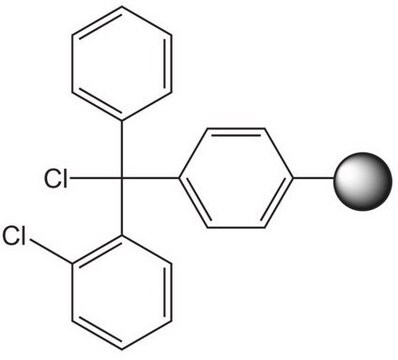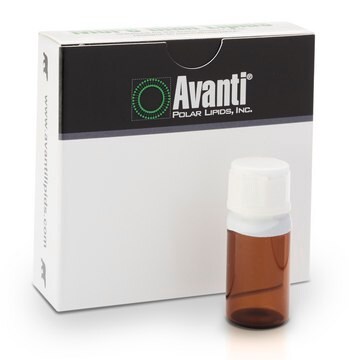QBD10932
m-dPEG®48-MAL
>95% (HPLC)
Synonym(e):
m-PEG48-MAL, mPEG-maleimide, mPEG2000-maleimide, mPEG48-maleimide
Anmeldenzur Ansicht organisationsspezifischer und vertraglich vereinbarter Preise
Alle Fotos(1)
About This Item
Empirische Formel (Hill-System):
C104H202N2O51
Molekulargewicht:
2296.70
MDL-Nummer:
UNSPSC-Code:
12352200
NACRES:
NA.22
Empfohlene Produkte
Assay
>95% (HPLC)
Form
solid or viscous liquid
Eignung der Reaktion
reaction type: Pegylations
Polymerarchitektur
shape: linear
functionality: monofunctional
Versandbedingung
ambient
Lagertemp.
−20°C
Leistungsmerkmale und Vorteile
m-dPEG48-MAL is a thiol-reactive, monodispersed PEGylation reagent used for surface and biomolecule modification. One end of the PEG molecule is methyl-terminated. The opposite end possesses a 3-maleimido propanoic acid functional group that connects to the PEG spacer via an amide bond. The maleimide moiety reacts with sulfhydryl groups by the thiol-Michael addition reaction. The single molecular weight, discrete-length PEG (dPEG) chain is 152 atoms (178.6 Å) long, including the reactive site on the maleimide ring. The dPEG48 is a monodisperse equivalent of the polymeric PEG2000.
Rechtliche Hinweise
Products Protected under U.S. Patent #s 7,888,536 & 8,637,711 and European Patent #s 1,594,440 & 2,750,681
dPEG is a registered trademark of Quanta BioDesign
Lagerklassenschlüssel
11 - Combustible Solids
WGK
WGK 3
Flammpunkt (°F)
Not applicable
Flammpunkt (°C)
Not applicable
Hier finden Sie alle aktuellen Versionen:
Analysenzertifikate (COA)
Lot/Batch Number
Leider sind derzeit keine COAs für dieses Produkt online verfügbar.
Wenn Sie Hilfe benötigen, wenden Sie sich bitte an Kundensupport
Besitzen Sie dieses Produkt bereits?
In der Dokumentenbibliothek finden Sie die Dokumentation zu den Produkten, die Sie kürzlich erworben haben.
Nicholas M Molino et al.
Biomacromolecules, 13(4), 974-981 (2012-03-16)
Self-assembling protein nanocapsules can be engineered for various bionanotechnology applications. Using the dodecahedral scaffold of the E2 subunit from pyruvate dehydrogenase, we introduced non-native surface cysteines for site-directed functionalization. The modified nanoparticle's structural, assembly, and thermostability properties were comparable to
Unser Team von Wissenschaftlern verfügt über Erfahrung in allen Forschungsbereichen einschließlich Life Science, Materialwissenschaften, chemischer Synthese, Chromatographie, Analytik und vielen mehr..
Setzen Sie sich mit dem technischen Dienst in Verbindung.

![O-[N-(3-Maleimido-propionyl)-aminoethyl]-O′-[3-(N-succinimidyloxy)-3-oxopropyl]-heptacosaethylenglykol ≥90% (oligomer purity)](/deepweb/assets/sigmaaldrich/product/structures/367/864/1c31a65f-501f-4464-8bb3-edff0d131a12/640/1c31a65f-501f-4464-8bb3-edff0d131a12.png)






